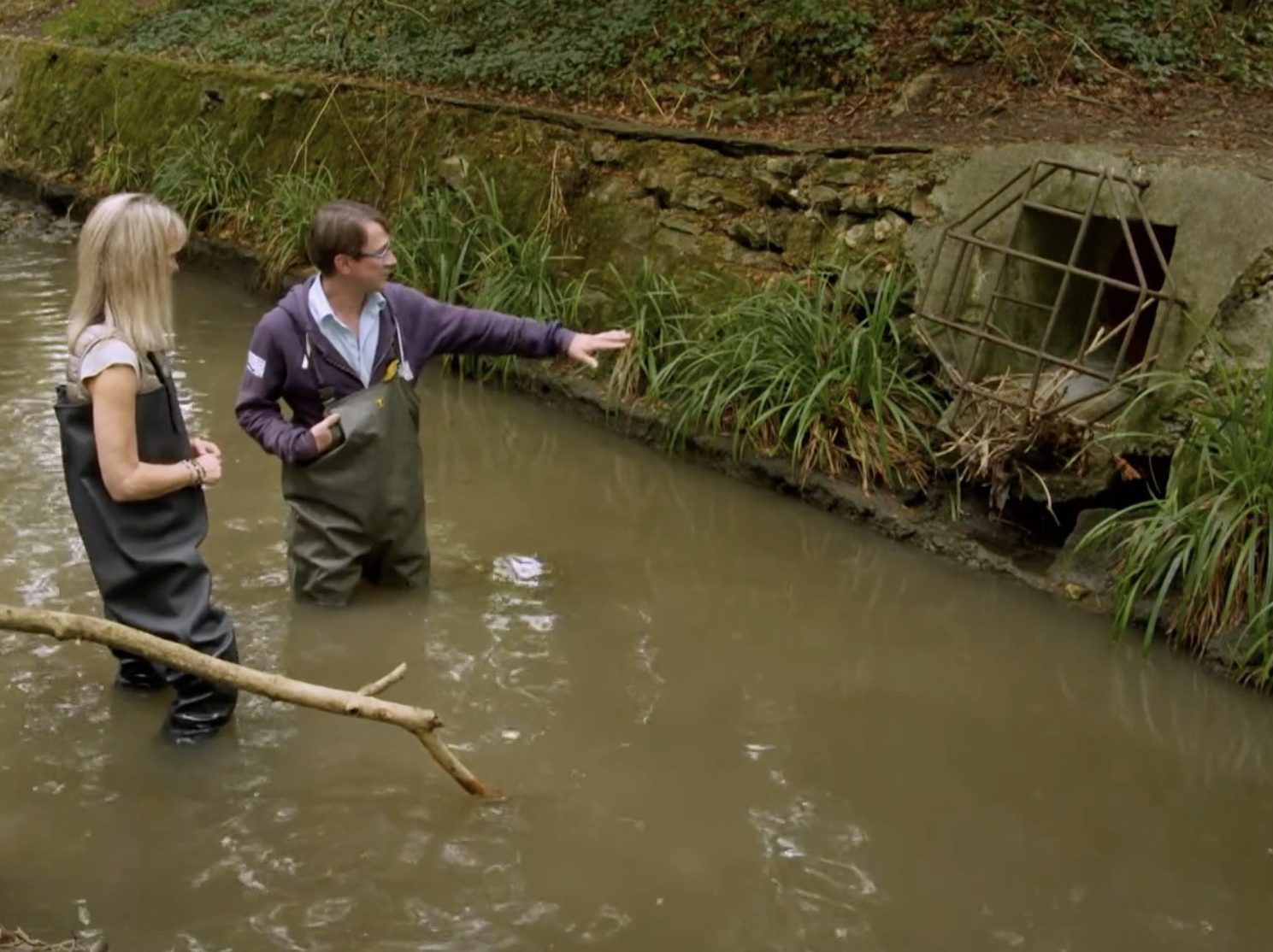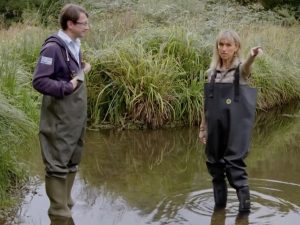At the start of October, the South East Rivers Trust appeared on Channel 5’s documentary about sewage in our rivers. The programme demonstrated the extent of the problem nationwide, quoting swimmers and environmental campaigners. Below is a snippet of our involvement in highlighting the issues – and three actions you can take.

“The soft sediment underneath – I think you can imagine what it’s made up of,” remarked Dr Chris Gardner to TV presenter Michaela Strachan during Swimming in Sewage: Britain’s Water Scandal.
Our Head of Science and Partnerships was describing what lies at the bottom of the River Hogsmill right next to a Combined Sewer Overflow (CSO), an mechanism that sends raw sewage into rivers during heavy rainfall.
Aired on October 4, the documentary highlighted the effects of sewage being regularly pumped into our rivers, up and down the country. Rivers that were once clean to swim in are now full of what we flush down the loo, causing health issues for those unaware that raw sewage is being sent into them regularly, from these CSOs.
These pipes were designed to stop sewage backing up into homes during heavy rainfall, when sewage treatment works could not cope with the amount of waste and excess rainfall coming from urbanised environments. These single pipes combine waste water from our homes and businesses and surface water. They are supposed to be in operation sparingly. Last year, 15,000 CSOs across the country spilled water into our rivers for 2.5 million hours, the programme reported.

Chris had given Michaela a tour of a clean looking section of the Hogsmill. One of only 210 chalk streams in the world, its clear water – filtered through springs – provides a superb environment for aquatic life.
But as Chris took the presenter to the confluence of where the river meets the Green Lane stream on the River Hogsmill, the colour of the water suddenly became much more murky. The cameras showed dirt and sediment on the riverbed.
Dressed in waders, the pair moved to the site of a CSO, where Chris pointed to clear signs of it sending sewage into the river very recently – most likely the night before when it had rained.
Investment needed
Michaela, recoiling at the thought of raw sewage in this rare chalk stream which should be rich in minerals, asked what could be done?
Chris replied: “We need to invest in the sewage works infrastructure. For the past few decades we haven’t had the investment to keep up with the population growth. We also have climate change and more intense rainfalls.”
Many of the sewers have been around since Victorian times, so Michaela also wanted to know if it was possible to upgrade them?
“There certainly is a technical challenge,” replied Chris, “but we put people on the moon with [what is now] the computer power of a pocket calculator 50 years ago so, surely, we can upgrade our sewage works to the standards required.”
Our Chamber Mead wetlands project, which began in late August, is very close to where the filming took place. The wetlands will help to divert water from road run-off and urbanised pollution away from the Hogsmill. It will divert the Green Lanes stream – as seen in the documentary – into a series of new wetlands and project 200 metres of this chalk stream.
But what can you do to help protect rivers from sewage and pollution?
First, you can demand action from your Water Company. The programme’s airing could not have been more timely, coming just after water companies submitted their business plans for 2025-30 to Ofwat. Our recent blog looks at these plans and urges you to sign up to your water company’s online session, where you can question them about the details. These take place before the end of November. Are their timetables for addressing this urgent problem of sewage fast enough? How will they upgrade infrastructure? What nature-based solutions in urban areas are they planning to combat water, combined with sewage, rushing into our rivers all at once during heavy rainfall?
Second, you can sign the Rivers Trust’s Nature2030 campaign, asking all political parties to make five nature pledges in their manifestos ahead of a General Election, which many expect to take place next year. This asks that the “polluter pays” and for a Natural Nature Service, to protect our environment.
Third, you can back the Rivers Trust’s call to end the #ChemicalCocktail polluting all our rivers. This letter to the Government asks for several protections to be included for rivers in the Chemical Strategy.
- Swimming in Sewage: Britain’s Water Scandal was produced by Turquoise TV and is available on Channel 5’s catch-up facility.
